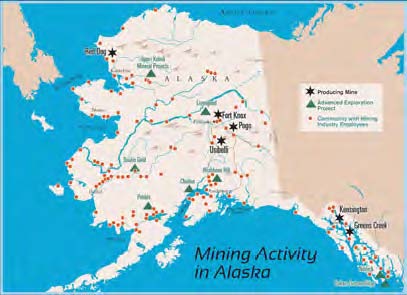EPA’s effort to preempt Pebble sets
dangerous precedent for future projects
By Marleanna Hall
In July, the Environmental Protection Agency (EPA) released a Proposed Determination of the U.S. EPA Region 10 Pursuant to Section 404(c) of the Clean Water Act (CWA) on the Pebble Deposit Area. The proposed determination attempts to assess the effects of a potential mining project, without the project plans.
Before the September 19 deadline, the EPA received over 575,000 comments on the proposed determination. RDC submitted comments requesting the EPA withdraw its proposed determination, and discard the flawed Bristol Bay Assessment, noting the EPA’s efforts are establishing a dangerous precedent for future projects in Alaska and around the United States.
The proposed determination is not based on actual mine plans, and focuses on the effects of a mining project that has not been proposed, and for which key engineering solutions, environmental safeguards, and mitigation measures have not been provided. RDC noted it is a deeply flawed and speculative approach.
The CWA does give the EPA authority to veto other agencies’ approval of permits, however, it is unprecedented that the EPA would administer this authority in advance of any permit application and before a detailed review of the facts. Moreover, the agency has rarely used its veto authority and never in advance of permits being issued by other agencies.
RDC pointed out in its comments that every project, no matter the size or location, should have an opportunity to be reviewed under existing legal processes. In the case of mining, there are more than 60 major permits and hundreds more from local, state, and federal agencies that must be successfully obtained. If the process determines a project as designed cannot protect the environment and other resources, it will not advance. The process will not permit one industry to advance at the expense of another.
Article VII of Alaska’s constitution mandates the state develop its natural resources for the benefit of all Alaskans, and it is the state’s responsibility to objectively evaluate opportunities to balance competing interests in the best interests of its citizens. Alaska cannot do that if projects continue to be halted by overreaching outside interests, RDC explained.
Additionally, RDC expressed concerns that the proposed determination was developed under a preemptive effort that undermines the existing permitting and review process, such as those under National Environmental Policy Act (NEPA). The Pebble Limited Partnership (PLP) filed suit in May in U.S. District Court for Alaska seeking an injunction to stop the EPA’s process to preemptively veto the Pebble Project under Section 404(c) of the CWA and arguing that EPA does not have statutory authority to take this step.
The State of Alaska intervened in the injunction suit, and RDC with five other trade associations filed as amici in support of PLP and the State. RDC has urged the EPA to halt further actions, until the court makes a decision, and until the project receives full review under NEPA.
Unfortunately a motion to dismiss the case by the EPA was accepted by the judge who said the case was not yet ready for judicial review.
In another case, PLP charges that the EPA has not complied with the Federal Advisory Committee Act and the Administrative Procedure Act in preparing the Bristol Bay Assessment study, upon which the Section 404(c) regulatory process is largely based. (See inset for more details). In late September, the EPA agreed to stay its Section 404(c) action until early January to allow the issues to be heard in front of the District Court.
In early September, PLP’s Chief Executive Officer, Tom Collier, presented to an RDC breakfast meeting. Collier noted that Pebble has been “the subject of the first ever, in the history of the Clean Water Act, attempt to put a project out of business even before an application for a permit has been filed.”
A preemptive decision, prior to permit or project application and completion of the NEPA process, is unacceptable, whether it be approval or denial of any project in any industry, RDC said in its comments on the Proposed Determination.

The EPA’s Proposed Determination, which is occurring outside the well established state and federal environmental review process, sets a dangerous precedent for future projects that could underpin both rural and urban economies throughout Alaska.
Map: Courtesy Alaska Miners Association
Return to newsletter headlines